- Clone
- 4B2.9 (See other available formats)
- Regulatory Status
- RUO
- Other Names
- Vγ1 and Vγ2 (Tonegawa nomenclature), TRGV1, TRGV2, GV5S1, GV5S2
- Isotype
- Armenian Hamster IgG
- Ave. Rating
- Submit a Review
- Product Citations
- publications
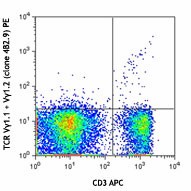
-

C57BL/6 mouse splenocytes were stained with CD3 APC and TCR Vγ1.1 + Vγ1.2 (clone 4B2.9) PE (top) or Armenian hamster IgG PE isotype control (bottom). -

| Cat # | Size | Price | Quantity Check Availability | Save | ||
|---|---|---|---|---|---|---|
| 142703 | 25 µg | 104€ | ||||
| 142704 | 100 µg | 215€ | ||||
In mice, the TCR γ locus consists of seven Vγ, four Jγ, and four Cγ genes, which are differentially expressed throughout their lifespan. During fetal and early postnatal life, very few γ/δ T cells express TCR Vγ1.1 or Vγ1.2 chains. In adult mice, however, a major fraction of the γ/δ T cell repertoire comprises either TCR Vγ1.1 or Vγ1.2 chains. The Vγ1.1 gene rearranges almost exclusively with the Jγ4-Cγ4 genes, while the Vγ1.2 gene preferentially rearranges with Jγ1.
The 4B2.9 antibody reacts specifically with mouse TCR Vγ1.1 and Vγ1.2 as designated by the Garman nomenclature system. Mouse TCR Vγ1.1 and Vγ1.2 are also known as TCR Vγ1 and Vγ2, respectively, under the Heilig & Tonegawa nomenclature system.
Several TCR γ and δ chain nomenclature systems exist. In order to consolidate the various nomenclature systems, we have created charts for corresponding names across some of the most popular naming methods. Click here to see charts.
Product Details
- Verified Reactivity
- Mouse
- Antibody Type
- Monoclonal
- Host Species
- Armenian Hamster
- Immunogen
- TCR Vγ1.1/Vδ6 T3.13.1 hybridoma
- Formulation
- Phosphate-buffered solution, pH 7.2, containing 0.09% sodium azide.
- Preparation
- The antibody was purified by affinity chromatography and conjugated with PE under optimal conditions.
- Concentration
- 0.2 mg/ml
- Storage & Handling
- The antibody solution should be stored undiluted between 2°C and 8°C, and protected from prolonged exposure to light. Do not freeze.
- Application
-
FC - Quality tested
- Recommended Usage
-
Each lot of this antibody is quality control tested by immunofluorescent staining with flow cytometric analysis. For flow cytometric staining, the suggested use of this reagent is ≤1.0 µg per million cells in 100 µl volume. It is recommended that the reagent be titrated for optimal performance for each application.
- Excitation Laser
-
Blue Laser (488 nm)
Green Laser (532 nm)/Yellow-Green Laser (561 nm)
- Application Notes
-
mAb 4B2.9 specifically recognizes γ/δ T cells expressing Vγ1.1 and/or Vγ1.2 chains.
-
Application References
(PubMed link indicates BioLegend citation) -
- Pereira P and Boucontet L. 2004. J. Immunol. 173:3261. (FC)
- Product Citations
-
- RRID
-
AB_10960739 (BioLegend Cat. No. 142703)
AB_10962688 (BioLegend Cat. No. 142704)
Antigen Details
- Distribution
-
Subset of γ/δ T cells
- Function
- Antigen recognition
- Cell Type
- T cells
- Biology Area
- Adaptive Immunity, Immunology
- Molecular Family
- TCRs
- Antigen References
-
1. Garcia-Herrera A, et al. 2011. Am. J. Surg. Pathol. 35:1214.
2. Gutierrez A, et al. 2010. J. Clin. Oncol. 28:3816.
3. Zhang X, et al. 2009. Hematology 14:237. - Gene ID
- 110067 View all products for this Gene ID
- UniProt
- View information about TCR Vgamma1.1 1.2 on UniProt.org
Related Pages & Pathways
Pages
Related FAQs
- What type of PE do you use in your conjugates?
- We use R-PE in our conjugates.
Other Formats
View All TCR Vγ1.1, 1.2 Reagents Request Custom Conjugation| Description | Clone | Applications |
|---|---|---|
| PE anti-mouse TCR Vγ1.1 + Vγ1.2 | 4B2.9 | FC |
| Purified anti-mouse TCR Vγ1.1 + Vγ1.2 | 4B2.9 | FC |
Customers Also Purchased
Compare Data Across All Formats
This data display is provided for general comparisons between formats.
Your actual data may vary due to variations in samples, target cells, instruments and their settings, staining conditions, and other factors.
If you need assistance with selecting the best format contact our expert technical support team.
-
PE anti-mouse TCR Vγ1.1 + Vγ1.2
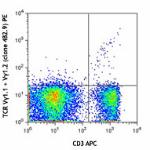
C57BL/6 mouse splenocytes were stained with CD3 APC and TCR ... 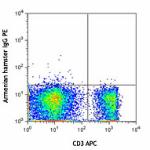
-
Purified anti-mouse TCR Vγ1.1 + Vγ1.2

C57BL/6 mouse splenocytes were stained with TCR Vγ1.1 + Vγ1.... 
 Login / Register
Login / Register 









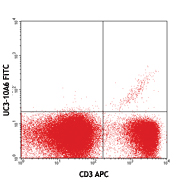
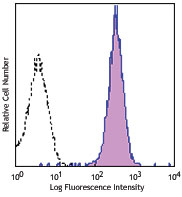
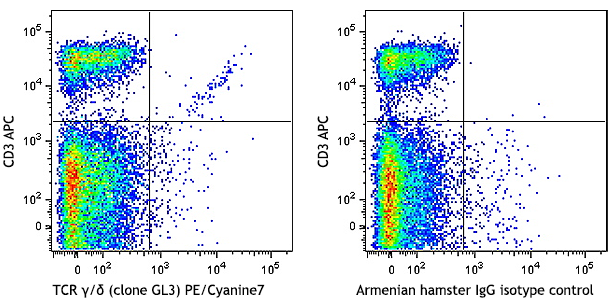




Follow Us